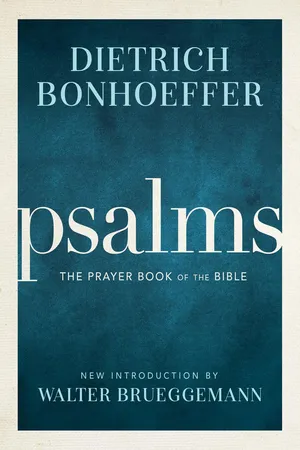
- 128 pages
- English
- ePUB (mobile friendly)
- Available on iOS & Android
About this book
"A valuable guide to these joyful, angry, beautiful, and difficult 'earthly prayers' that allow us... a deep human connection to the God who remains with us and will not abandon us." --Kathleen Norris, author of Dakota, The Cloister Walk, and Acedia & Me
Jesus died with a psalm on his lips. For millennia, humans have been shaped by the Psalms. And before the Nazis banned him from publishing, German theologian Dietrich Bonhoeffer published this book on the Psalms.
What comfort is found in the Psalter? What praise, and what challenge? What threat? In the pages of Psalms: The Prayer Book of the Bible, discover the richness this book of Scripture held for Bonhoeffer, and learn to pray psalms along with Christ.
First published in 1940, this classic reveals how the Psalms are essential to the life of the believer and offers Bonhoeffer's reflections on psalms of thanksgiving, suffering, guilt, praise, and lament. Now with an introduction by Walter Brueggemann and excerpts from the Psalms, Bonhoeffer's timeless work offers contemporary readers ancient wisdom and resources for the living of these days. Includes a biographical sketch of Bonhoeffer written by his friend and biographer Eberhard Bethge.
Frequently asked questions
- Essential is ideal for learners and professionals who enjoy exploring a wide range of subjects. Access the Essential Library with 800,000+ trusted titles and best-sellers across business, personal growth, and the humanities. Includes unlimited reading time and Standard Read Aloud voice.
- Complete: Perfect for advanced learners and researchers needing full, unrestricted access. Unlock 1.4M+ books across hundreds of subjects, including academic and specialized titles. The Complete Plan also includes advanced features like Premium Read Aloud and Research Assistant.
Please note we cannot support devices running on iOS 13 and Android 7 or earlier. Learn more about using the app.
Information
1
“Lord, Teach Us to Pray!”
2
Learning to Pray in the Name of Jesus
3
Who Prays the Psalms?
Table of contents
- Cover
- Title Page
- Copyright Page
- Contents
- Introduction by Walter Brueggemann
- 1. “Lord, Teach Us to Pray!”
- 2. Learning to Pray in the Name of Jesus
- 3. Who Prays the Psalms?
- 4. Names, Music, Verse Form
- 5. Congregational Worship and the Psalms
- 6. Classification
- 7. The Creation
- 8. The Law
- 9. Holy History
- 10. The Messiah
- 11. The Church
- 12. Life
- 13. Suffering
- 14. Guilt
- 15. The Enemies
- 16. The End
- 17. Petition for the Spirit of Life
- 18. The Blessing of Morning Prayer
- Dietrich Bonhoeffer: A Biographical Sketch by Eberhard Bethge